the American Enlightenment美国启蒙运动 文学
- 格式:ppt
- 大小:127.50 KB
- 文档页数:5
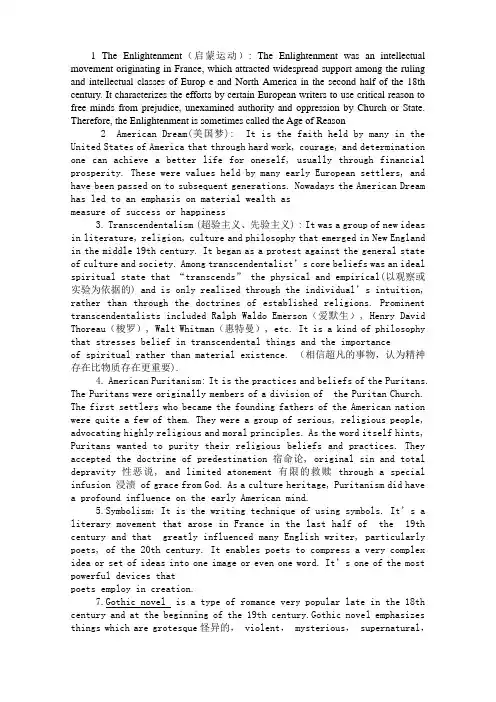
1 The Enlightenment(启蒙运动): The Enlightenment was an intellectual movement originating in France, which attracted widespread support among the ruling and intellectual classes of Europ e and North America in the second half of the 18th century. It characterizes the efforts by certain European writers to use critical reason to free minds from prejudice, unexamined authority and oppression by Church or State. Therefore, the Enlightenment is sometimes called the Age of Reason2 American Dream(美国梦): It is the faith held by many in the United States of America that through hard work, courage, and determination one can achieve a better life for oneself, usually through financial prosperity. These were values held by many early European settlers, and have been passed on to subsequent generations. Nowadays the American Dream has led to an emphasis on material wealth asmeasure of success or happiness3. Transcendentalism (超验主义、先验主义) : It was a group of new ideas in literature, religion, culture and philosophy that emerged in New England in the middle 19th century. It began as a protest against the general state of culture and society. Among transcendentalist’s core beliefs was an ideal spiritual state that “transcends” the physical and empirical(以观察或实验为依据的) and is only realized through the individual’s intuition, rather than through the doctrines of established religions. Prominent transcendentalists included Ralph Waldo Emerson(爱默生), Henry David Thoreau(梭罗), Walt Whitman(惠特曼), etc. It is a kind of philosophy that stresses belief in transcendental things and the importanceof spiritual rather than material existence. (相信超凡的事物,认为精神存在比物质存在更重要).4. American Puritanism: It is the practices and beliefs of the Puritans. The Puritans were originally members of a division of the Puritan Church. The first settlers who became the founding fathers of the American nation were quite a few of them. They were a group of serious, religious people, advocating highly religious and moral principles. As the word itself hints, Puritans wanted to purity their religious beliefs and practices. They accepted the doctrine of predestination宿命论, original sin and total depravity性恶说, and limited atonement 有限的救赎 through a special infusion 浸渍 of grace from God. As a culture heritage, Puritanism did havea profound influence on the early American mind.5.Symbolism:It is the writing technique of using symbols. It’s a literary movement that arose in France in the last half of the 19th century and that greatly influenced many English writer, particularly poets, of the 20th century. It enables poets to compress a very complex idea or set of ideas into one image or even one word. It’s one of the most powerful devices thatpoets employ in creation.7.Gothic novel is a type of romance very popular late in the 18th century and at the beginning of the 19th century.Gothic novel emphasizes things which are grotesque怪异的, violent, mysterious, supernatural,desolate 荒凉 and horrifying. Gothic, originally in the sense of“medic医学,not classical”,with its descriptions of the dark,irrational side of human nature,Gothic novel has exerted a great influence over the writers of the Romantic period.8 Imagism: it’s a poetic movement of England and the U.S flourished from 1909 to 1917. The movement insists on the creation of images in poetry by “the direct treatment of the thing” and the economy of wording. The leaders of this movement were Ezra Pound and Amy Lowell艾米•洛威尔.8. Imagism: It came into being in Britain and U.S around 1910 as a reaction to the traditional English poetry to express the sense of fragmentation and dislocation. The imagists, with Ezra Pound leading the way, hold that the most effective means to express these momentary impressions is through the use of one dominant image. Imagism is characterized by the following three poetic principles: direct treatment of subject matter; economy of expression; as regards rhythm, to compose in the sequence of the musical phrase, not in the sequence of metronome 节拍器. Pound’s “In a Station of the Metro” is a well-known imagist poem.9. Stream of Consciousness(意识流): It is a style used in the presentation of the character’s inner working of mind. The assumption is that an individual’s psychological processes are a continuous flow like a shifting, uninterrupted stream, highly changeable and confusing, often appearing illogical and contrary to reason. In tracing the stream of consciousness of an individual the writer may present interior monologue(内心独白) by his character, hint with symbols, reverse(颠倒) the order of time, and alternate(轮流的/交替的) recollections(回忆) with the present or sometime illusions(幻想) with given facts.10. Point of view( 视角):It is a term referring to the vantage point (能观察某事物的有利位置) or position from which a story is told. To identify(识别) the narrator of a story is to identify the story’s point of view. Basically there are two narrative ways: first-person point of view and the third-personpoint of view.12. The Harlem Renaissance: it was the first important movement in black American literature. Immediately after the First World War, as a result of a massive black migration to Northern cities, a group of young, talented black artists congregated in Harlem, a predominantly black section of New York City, and made it the cultural, and intellectual capital of black America. They carried forward the cultural traditions of their people and demonstrated their achievements to the white society that habitually ignored them.13. Expressionism 表现主义: it arouse in German theater after World War I. Delighting in bizarre (奇异的) stage design and exaggerated makeup and costuming(服装), expressionists sought to reflect intense states of emotion. Its mode is “the externalization(外表性) of t he inner.”14.Black humor: It is a combination of humor with resentment(怨恨), gloom, anger, and despair. Seeing all that is unreasonable, hypocritical,ugly, and even frenzied(狂乱的),writers of black humor nurse a grievance(不平) against their society which, according to them, is full of institutionalized(制度化的) absurdity. Yet they are cynical. They laugh a morbid(病态的) laugh when facing the hideous(丑恶的). In hopeless indignation(愤慨) they take up freezing irony and burning satire as their weapons. Their novels are often in the form of anti-novel(反传统小说), devoid of(缺乏) completeness of plot and characterized by fragmentation (零碎的) and dislocation(混乱).(专业文档资料素材和资料部分来自网络,供参考。
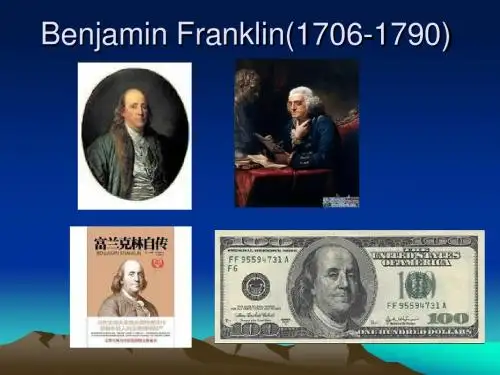
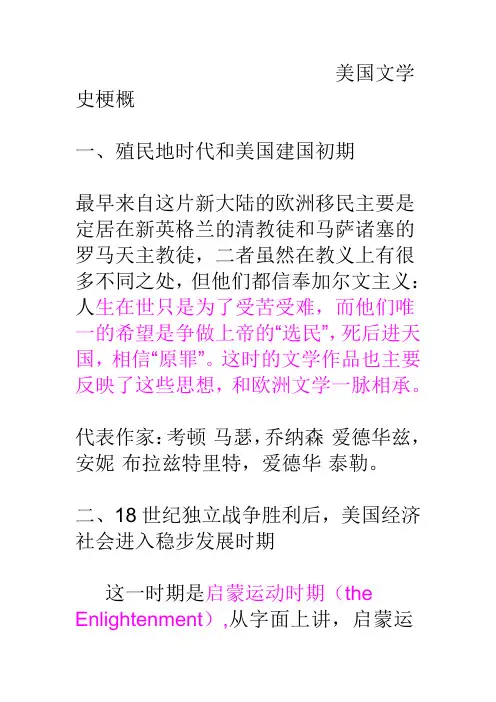
美国文学史梗概一、殖民地时代和美国建国初期最早来自这片新大陆的欧洲移民主要是定居在新英格兰的清教徒和马萨诸塞的罗马天主教徒,二者虽然在教义上有很多不同之处,但他们都信奉加尔文主义:人生在世只是为了受苦受难,而他们唯一的希望是争做上帝的“选民”,死后进天国,相信“原罪”。
这时的文学作品也主要反映了这些思想,和欧洲文学一脉相承。
代表作家:考顿·马瑟,乔纳森·爱德华兹,安妮·布拉兹特里特,爱德华·泰勒。
二、18世纪独立战争胜利后,美国经济社会进入稳步发展时期这一时期是启蒙运动时期(the Enlightenment),从字面上讲,启蒙运动就是启迪蒙昧,反对愚昧主义,提倡普及文化教育的运动。
但就其精神实质上看,它是宣扬资产阶级政治思想体系的运动,并非单纯是文学运动。
它是文艺复兴时期资产阶级反封建、反禁欲、反教会斗争的继续和发展,直接为一七八九年的法国大革命奠定了思想基础。
启蒙思想家们从人文主义者手里进一步从理论上证明封建制度的不合理,从而提出一整套哲学理论,政治纲领和社会改革方案,要求建立一个以“理性”为基础的社会。
他们用政治自由对抗专制暴政,用信仰自由对抗宗教压迫,用自然神论和无神论来摧毁天主教权威和宗教偶像,用“天赋人权”的口号来反对“君权神授”的观点,用“人人在法律面前平等”来反对贵族的等级特权,进而建立资产阶级的政权。
是欧洲第二次思想解放运动。
)主要文学指导思想是“自然神论”(Deism),这个思想认为虽然上帝创造了宇宙和它存在的规则,但是在此之后上帝并不再对这个世界的发展产生影响。
自然神论反对蒙昧主义和神秘主义,否定迷信和各种违反自然规律的“奇迹”;认为上帝不过是“世界理性”或“有智慧的意志”;上帝作为世界的“始因”或“造物主”,它在创世之后就不再干预世界事务,而让世界按照它本身的规律存在和发展下去;主张用“理性宗教”代替“天启宗教”。
人生在世,不再是受苦受难以换取来世的新生,而是要消灭种族、性别和信仰的不平等,建立自己的“人间乐园”。
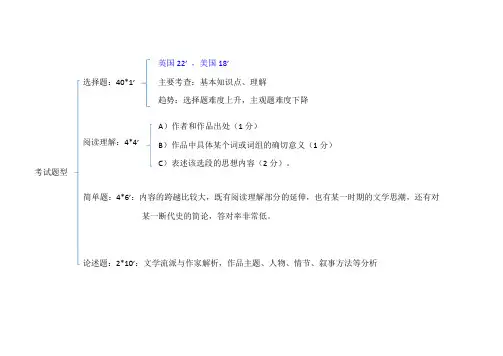

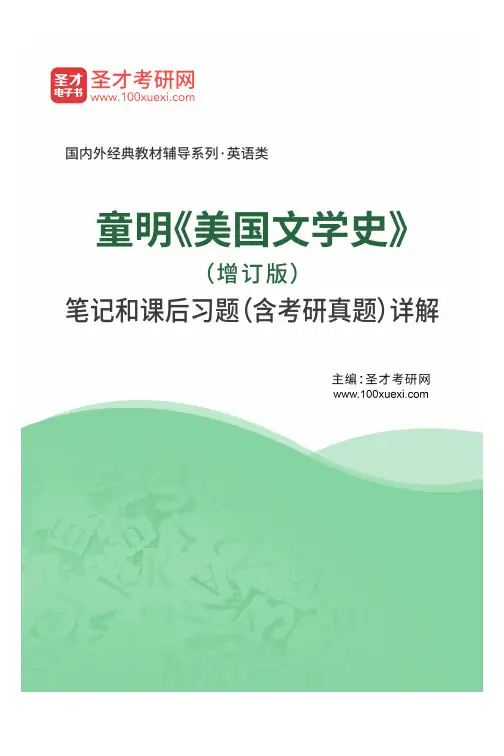
我国各大院校一般都把国内外通用的权威教科书作为本科生和研究生学习专业课程的参考教材,这些教材甚至被很多考试(特别是硕士和博士入学考试)和培训项目作为指定参考书。
为了帮助读者更好地学习专业课,我们有针对性地编著了一套与国内外教材配套的复习资料,并提供配套的名师讲堂、电子书和题库。
《美国文学史》(增订版)(童明主编)一直被用作高等院校英语专业英美文学教材,被很多院校指定为英语专业考研必读书和学术研究参考书。
为了帮助读者更好地使用该教材,我们精心编著了它的配套辅导用书。
作为该教材的学习辅导书,全书遵循该教材的章目编排,共分27章,每章由三部分组成:第一部分为复习笔记(中英文对照),总结本章的重点难点;第二部分是课后习题详解,对该书的课后思考题进行了详细解答;第三部分是考研真题与典型题详解,精选名校经典考研真题及相关习题,并提供了详细的参考答案。
本书具有以下几个方面的特点:1.梳理章节脉络,归纳核心考点。
每章的复习笔记以该教材为主并结合其他教材对本章的重难点知识进行了整理,并参考了国内名校名师讲授该教材的课堂笔记,对核心考点进行了归纳总结。
2.中英双语对照,凸显难点要点。
本书章节笔记采用了中英文对照的形式,强化对重要难点知识的理解和运用。
3.解析课后习题,提供详尽答案。
本书对童明主编的《美国文学史》(增订版)每章的课后思考题均进行了详细的分析和解答,并对相关重要知识点进行了延伸和归纳。
4.精选考研真题,补充难点习题。
本书精选名校近年考研真题及相关习题,并提供答案和详解。
所选真题和习题基本体现了各个章节的考点和难点,但又不完全局限于教材内容,是对教材内容极好的补充。
第1部分 早期美国文学:殖民时期至1815年第1章 “新世界”的文学1.1 复习笔记1.2 课后习题详解1.3 考研真题和典型题详解第2章 殖民地时期的美国文学:1620—1763 2.1 复习笔记2.2 课后习题详解2.3 考研真题和典型题详解第3章 文学与美国革命:1764—18153.1 复习笔记3.2 课后习题详解3.3 考研真题和典型题详解第2部分 美国浪漫主义时期:1815—1865第4章 美国浪漫主义时期4.1 复习笔记4.2 课后习题详解4.3 考研真题和典型题详解第5章 早期浪漫主义5.1 复习笔记5.2 课后习题详解5.3 考研真题和典型题详解第6章 超验主义和符号表征6.1 复习笔记6.2 课后习题详解6.3 考研真题和典型题详解第7章 霍桑、麦尔维尔和坡7.1 复习笔记7.2 课后习题详解7.3 考研真题和典型题详解第8章 惠特曼和狄金森8.1 复习笔记8.2 课后习题详解8.3 考研真题和典型题详解第9章 文学分支:反对奴隶制的写作9.1 复习笔记9.2 课后习题详解9.3 考研真题和典型题详解第3部分 美国现实主义时期:1865—1914第10章 现实主义时期10.1 复习笔记10.2 课后习题详解10.3 考研真题和典型题详解第11章 地区和地方色彩写作11.1 复习笔记11.2 课后习题详解11.3 考研真题和典型题详解第12章 亨利·詹姆斯和威廉·迪恩·豪威尔斯12.1 复习笔记12.2 课后习题详解12.3 考研真题和典型题详解第13章 自然主义文学13.1 复习笔记13.2 课后习题详解13.3 考研真题和典型题详解第14章 女性作家书写“女性问题”14.1 复习笔记14.2 课后习题详解14.3 考研真题和典型题详解第4部分 美国现代主义时期:1914—1945第15章 美国现代主义15.1 复习笔记15.1 复习笔记15.2 课后习题详解15.3 考研真题和典型题详解第16章 现代主义的演变16.1 复习笔记16.2 课后习题详解16.3 考研真题和典型题详解第17章 欧洲的美国现代主义17.1 复习笔记17.2 课后习题详解17.3 考研真题和典型题详解第18章 两次世界大战间的现代小说18.1 复习笔记18.2 课后习题详解18.3 考研真题和典型题详解第19章 现代美国诗歌19.1 复习笔记19.2 课后习题详解19.3 考研真题和典型题详解第20章 非裔美国小说和现代主义20.1 复习笔记20.2 课后习题详解20.3 考研真题和典型题详解第5部分 多元化的美国文学:1945年至新千年第21章 新形势下的多元化文学21.1 复习笔记21.2 课后习题详解21.3 考研真题和典型题解析第22章 美国戏剧:三大剧作家22.1 复习笔记22.2 课后习题详解22.3 考研真题和典型题详解第23章 主要小说家:1945年至60年代23.1 复习笔记23.2 课后习题详解23.3 考研真题和典型题详解第24章 1945年以来的诗学倾向24.1 复习笔记24.2 课后习题详解24.3 考研真题和典型题详解第25章 20世纪60年代以来的小说发展状况25.1 复习笔记25.2 课后习题详解25.3 考研真题和典型题详解第26章 当代多民族文学和小说26.1 复习笔记26.2 课后习题详解26.3 考研真题和典型题详解第27章 美国文学的全球化:流散作家27.1 复习笔记27.2 课后习题详解27.3 考研真题和典型题详解第1部分 早期美国文学:殖民时期至1815年第1章 “新世界”的文学1.1 复习笔记Ⅰ. Discoveries of America(发现美洲大陆)Who discovered America?谁发现了美洲?1 The credit is often attributed to Christopher Columbus. Yet this argument is controversial.一种说法是哥伦布发现了美洲大陆。
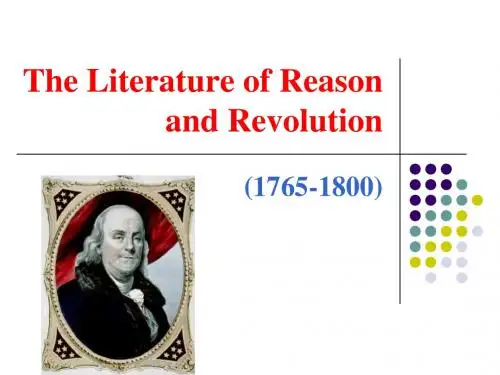
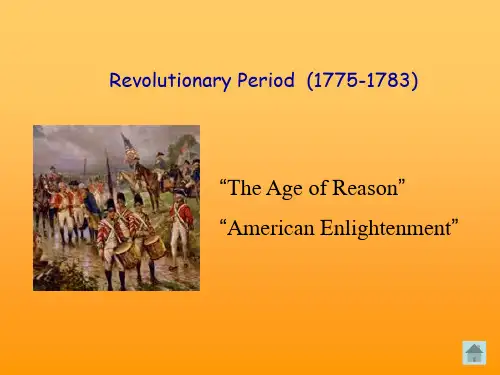
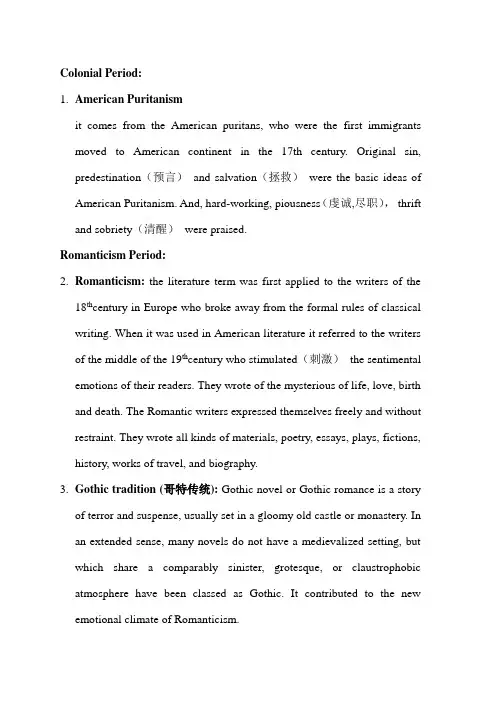
Colonial Period:1.American Puritanismit comes from the American puritans, who were the first immigrants moved to American continent in the 17th century. Original sin, predestination(预言)and salvation(拯救)were the basic ideas of American Puritanism. And, hard-working, piousness(虔诚,尽职),thrift and sobriety(清醒)were praised.Romanticism Period:2.Romanticism: the literature term was first applied to the writers of the18th century in Europe who broke away from the formal rules of classical writing. When it was used in American literature it referred to the writers of the middle of the 19th century who stimulated(刺激)the sentimental emotions of their readers. They wrote of the mysterious of life, love, birth and death. The Romantic writers expressed themselves freely and without restraint. They wrote all kinds of materials, poetry, essays, plays, fictions, history, works of travel, and biography.3.Gothic tradition (哥特传统): Gothic novel or Gothic romance is a storyof terror and suspense, usually set in a gloomy old castle or monastery. In an extended sense, many novels do not have a medievalized setting, but which share a comparably sinister, grotesque, or claustrophobic atmosphere have been classed as Gothic. It contributed to the new emotional climate of Romanticism.4.Transcendentalism (先验说,超越论): is a philosophic and literarymovement that flourished in New England, particular at Concord, as a reaction against Rationalism and Calvinism (理性主义and喀尔文主义). Mainly it stressed intuitive understanding of God, without the help of the church, and advocated independence of the mind. The representative writers are Emerson and Thoreau.5.Stream of consciousness(意识流):It is one of the modern literarytechniques. It is the style of writing that attempts to imitate the natural flow of a character’s thoughts, feelings, reflections, memories, and mental images as the character experiences them. It was first used in 1922 by the Irish novelist James Joyce. Those novels broke through the bounds of time and space, and depicted vividly and skillfully the unconscious activity of the mind fast changing and flowing incessantly。
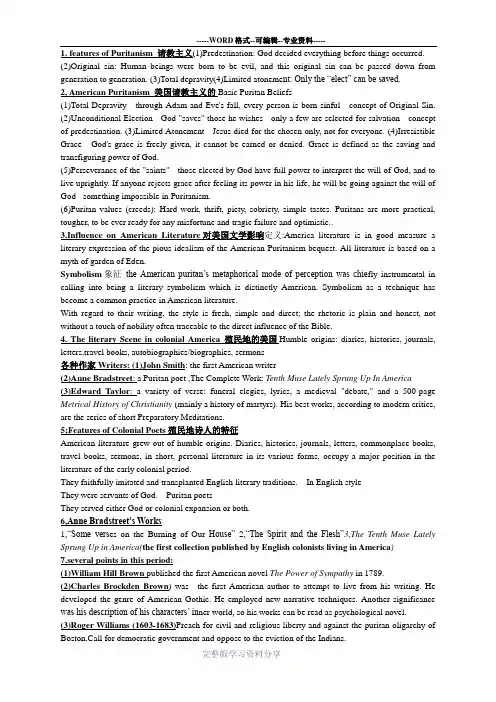
1. features of Puritanism 请教主义(1)Predestination: God decided everything before things occurred.(2)Original sin: Human beings were born to be evil, and this original sin can be passed down from generation to generation. (3)Total depravity(4)Limited atoneme nt: Only the “elect” can be saved.2, American Puritanism 美国请教主义的Basic Puritan Beliefs(1)Total Depravity - through Adam and Eve's fall, every person is born sinful - concept of Original Sin.(2)Unconditional Election - God "saves" those he wishes - only a few are selected for salvation - concept of predestination. (3)Limited Atonement - Jesus died for the chosen only, not for everyone. (4)Irresistible Grace - God's grace is freely given, it cannot be earned or denied. Grace is defined as the saving and transfiguring power of God.(5)Perseverance of the "saints" - those elected by God have full power to interpret the will of God, and to live uprightly. If anyone rejects grace after feeling its power in his life, he will be going against the will of God - something impossible in Puritanism.(6)Puritan values (creeds): Hard work, thrift, piety, sobriety, simple tastes. Puritans are more practical, tougher, to be ever ready for any misfortune and tragic failure and optimistic..3.Influence on American Literature对美国文学影响定义:America literature is in good measure a literary expression of the pious idealism of the American Puritanism bequest. All literature is based on a myth of garden of Eden.Symbolism象征the American puritan’s metaphorical mode of perception was chie fly instrumental in calling into being a literary symbolism which is distinctly American. Symbolism as a technique has become a common practice in American literature.With regard to their writing, the style is fresh, simple and direct; the rhetoric is plain and honest, not without a touch of nobility often traceable to the direct influence of the Bible.4. The literary Scene in colonial America 殖民地的美国Humble origins: diaries, histories, journals, letters,travel books, autobiographies/biographies, sermons各种作家Writers: (1)John Smith: the first American writer(2)Anne Bradstreet: a Puritan poet ,The Complete Work: Tenth Muse Lately Sprung Up In America(3)Edward Taylor: a variety of verse: funeral elegies, lyrics, a medieval "debate," and a 500-page Metrical History of Christianity (mainly a history of martyrs). His best works, according to modern critics, are the series of short Preparatory Meditations.5;Features of Colonial Poets殖民地诗人的特征American literature grew out of humble origins. Diaries, histories, journals, letters, commonplace books, travel books, sermons, in short, personal literature in its various forms, occupy a major position in the literature of the early colonial period.They faithfully imitated and transplanted English literary traditions.---In English styleThey were servants of God.---Puritan poetsThey served either God or colonial expansion or both.6,Anne Bradstreet’s Works1,“Some vers es on the Burning of Our House”2,“The Spirit and the Flesh”3,The Tenth Muse Lately Sprung Up in America(the first collection published by English colonists living in America)7.several points in this period:(1)William Hill Brown published the first American novel The Power of Sympathy in 1789.(2)Charles Brockden Brown) was the first American author to attempt to live from his writing. He developed the genre of American Gothic. He employed new narrative techniques. Another significance was his description of his characters’ in ner world, so his works can be read as psychological novel.(3)Roger Williams (1603-1683)Preach for civil and religious liberty and against the puritan oligarchy of Boston.Call for democratic government and oppose to the eviction of the Indians.Works: The Bloody Tenet of Persecution for the Cause of Conscience(4)CJohn Woolman1:From a pious Quaker family 2:Transcendentalism humanitarianism3:Plea for the rights of all men and the abolition of the slavery system.Works: Some Considerations on the Keeping of Negroes; A Plea for the Poor.(5)Thomas Paine :A great influence in the American RevolutionWorks: The Rights of Man; The Age of Reason(6)Philip Freneau:“Poet of the American Revolution”“Father of American Poetry”,the most significant poet of 18th century in America. Some off his themes and images anticipated theworks of such 19th century American Romantic writers as Cooper, Emerson, Poe and Melville.His works:(1) The Rising Glory of America1772 《美洲光辉的兴起》(2) The Wild Honey Suckle 1786 《野地里德忍冬》(3) The Indian Burying Ground1788 《印第安人墓地》(4The Dying Indian: Tomo Chequi《奄奄一息的印第安人:托姆·柴吉》关于他的评价:He was the most significant poet of 18th century America.Some of his themes and images anticipated the works of such 19th century American Romantic writers as Cooper, Emerson, Poe and Melville.Poet of American Independence: Freneau provides incentive and inspiration to the revolution by writing such poems as "The Rising Glory of America" and "Pictures of Columbus."Journalist: Freneau was editor and contributor of The Freeman's Journal (Philadelphia) from 1781-1784. In his writings, he advocated the essence of what is known as Jeffersonian democracy - decentralization of government, equality for the masses, etc.Freneau's Religion: Freneau is described as a deist - a believer in nature and humanity but not a pantheist. In deism, religion becomes an attitude of intellectual belief, not a matter of emotional of spiritual ecstasy. Freneau shows interest and sympathy for the humble and the oppressedFreneau as Father of American Poetry: His major themes are death, nature, transition, and the human in nature. All of these themes become important in 19th century writing.All the while.in romanticizing the wonders of nature in his writings...he searched for an American idiom in verse.8:The American Enlightenment 美国启蒙运动(1)It was a part of a larger intellectual movement known as the Age of Enlightenment. Influenced by the scientific revolution of the 17th century, the Enlightenment took scientific reasoning and applied it to human nature and society.(2)Reason was advocated as the primary source and basis of authority.There was a shift from God-centered thinking to human being centered. Instead of going through life unhappy and thinking they had to suffer so they could enjoy the afterlife - people began to think about what they could accomplish on earth.(3)Equality The American Enlightenment inflenced Benjamin Franklin dramatically.Great Awening影响(1)It is a serires of religious revivals that swept over the American colonies about the middle of the 18th century.(2)It results in doctrinal changes and influnce social and political thought.In New England it was started by the rousing preaching of Jonathan Edwards9:Jonathan Edwards Works: (1)The Freedom of the Will《论意志自由》(2)The Great Doctrine of Original Sin Defended《论原罪》(3)The Nature of True Virtue《论真实德行的本原》AssessmentJonathan Edwards was a good deal of a transcendentalistbecause of his ideas:a, The spirit of revivalism b. Regeneration of man c. God’s presence d. Puritan idealism10:Benjamin Franklin Works:1:The Autobiography《自传》(1)The Autobiography is, first of all, a Puritan document. It is a record of self-examination and self-improvement.(2)The Autobiography is also an eloquent elucidation of the fact that Benjamin Franklin was spokesman for the new order of 18th century enlightenment, and that he represented in America all its ideas, that man is basically good and free, by nature endowed by God with certain inalienable rights of liberty and the pursuit of happiness.(3)Through telling a success story of self-reliance, the book celebrates, in fact, the fulfillment of the American dream.Now a look at the style of The Autobiography will readily reveal that it is the pattern of Puritan simplicity, directness, and concisionThe Autobiography《自传》:It is perhaps the first real post-revolutionary American writing as well as the first real autobiography in English.It gives us the simple yet immensely fascinating record of a man rising to wealth and fame from a state of poverty and obscurity into which he was born, the faithful account of the colorful career of America’s first self-made man:2:Poo r Richard’s Almanac《穷理查德格言历书》Poor Richard’s Almanac is full of adages and common-sense witticism which became ,very quickly, household words.Benjamin Franklin Borrowed from such writers as Defoe, Swift, and Pope , and used his own wit to simplify and enrich their axioms11:General Introduction to Romanticism 浪漫主义介绍a. Romanticism is a complex artistic, literary, and intellectual movement that originated in the second half of the 18th century in Western Europe, and gained strength during the Industrial Revolution.b. It was partly a revolt against aristocratic social and political norms of the Age of Enlightenment and a reaction against the scientific rationalization of nature, and was embodied most strongly in the visual arts, music, and literature.The movement stressed运动强调a. strong emotion as a source of aesthetic experience, placing new emphasis on such emotions as trepidation, horror and awe—especially that which is experienced in confronting the sublimity of untamed nature and its picturesque qualities, both new aesthetic categories.b. It elevated folk art and custom to something noble.c. It argued for a "natural" epistemology of human activities as conditioned by nature in the formof language, custom and usage.12:Characteristics of Romanticism:浪漫主义特征(1)an innate and intuitive perception of man, nature and society—reliance on the subconscious, the inner life, the abnormal psychology(2)an emphasis on freedom, individualism and imagination—rebellion against neoclassicism which stressed formality, order and authority(3)a profound love for nature—nature as a source of knowledge, nature as a refuge from the present, nature as a revelation of the holy spirit the quest for beauty—pure beautythe use of antique and fanciful subject matters—sense of terror, Gothic, grotesque, odd and queer13,Romanticism Historical Background历史背景1,Political: After American Revolution, American developed into a political, economic and cultural independence. Democracy and equality became the ideals of the new nation. Complete changes came about in the political life of the country.2. Economic: Industrialism spread widely and fast. A large number of immigrants arrived. All these produced an economic boom.3. Both the change in political and the economic development brought about a sense of optimism and hope.4. Culturally: Magazines appeared in ever-increasing numbers and they played an important role in facilitating literary expansion.5. Foreign influence added incentive to the growth of romanticism in America.14Features of American Romanticism美国浪漫主义特征a. Imitative: Some of the American Romantic writings were modeled on English and European works. The Romantic Movement proved to be a decisive influence. Without it, the rise of Romanticism would have been impossible. Romanticism writers such as Scott, Coleridge, Wordsworth, Byron all made a stimulating impact on American literature.b. Independent: From the very beginning, American Romanticism exhibited distinct features of its own. It originated from a mixture of factors which were altogether American rather than anything else.c. Puritan influence over American Romanticism was clearly noticeable. E.g., the author tended more to moralize than writers in England.15:Uniqueness of Am. Romanticism:美国浪漫主义独特性Unique subject matter:The western movement :the American national experience of pioneering into the west proved to be a rich source of material for American writers to draw upon. They celebrated American’s landsc ape with its virgin forests, meadows, groves, endless prairies, stream, and vast oceans. The wildness came to function almost as a dramatic character that symbolized moral law.Uniqueness of Am. Romanticism::the newness as a nation美国浪漫主义独特性的具体体现(1)The ideals of individualism and political equality, and their dream that America was to be a new Garden of Eden for man were distinctly American. This feeling of newness was strong enough to inspire the romantic imagination and channel it into different vein of writing.Puritan moral values(2)Puritan influence over American Romanticism was clearly noticeable. E.g., the author tended more to moralize than writers in England.(3)Mixture of different races:The immigrants coming from different cultural and social background bring with them different cultures16. Two phases:两个时期a. 1770s to 1830s Early period Representatives: Washington Irving, James Fenimore Cooperb.1830s to 1860s Late period summit of American literature Representatives: Emerson, Thoreau, Hawthorne, Melville, Whitman, Dickinson, Poe etc.;Washington Irving “Father of the American short storyHis Worksa. A History of New York from the Beginning of the World to the End of the Dutch Dynasty1809 《纽约外史》b. The Sketch Book of Geoffrey Crayon, Gent1819-1820 《见闻札记》c. Bracebridge Hall 1822 《布雷斯布里奇庄园》d. Oliver Goldsmith 1840 《哥尔德斯密斯》e. Life of George Washington1855-1859 《华盛顿传》The Sketch Book of Geoffrey Crayon, Gent1819-1820 《见闻札记》评价:(1)The Sketch Book is a collection of essays, sketches, and tales.(2)In The Sketch Book, the most famous and frequently anthologized(选编)are “Rip Van Winkle” 《瑞普·凡·温克》“The Legend of Sleepy Hollow” 《睡谷的传说》(3)The short story as a genre in American literature began with The Sketch Book.(4)The book touched the American imagination and foreshadowed the coming of Hawthorne, Melville, and Poe. (5)It also marked the beginning of American Romanticisms.The evaluation of Irving:a:Father of American literatureb:The beginning of short story as a genre-“Father of the American short story”c The first American writer of imaginative literature to gain international famed The Sketch Book also marked the beginning of American RomanticismThe theme of the storyThe story of man who has difficulties facing his advancing ageThe contradictory impulses in America toward work- the puritan attitude as opposed to the American desire for leisureThe theme of escape from one’s responsibilities and even one’s historyThe loss of identity19:James Fenimore Cooper(1789-1851)Major Works:Precaution戒备(1820, his first novel, imitating Austen’s Pride and Prejudice) The Spy间谍(his second novel and great success)皮袜子故事集:“Leatherstocking Tales” (his masterpiece, a series of five novels): The Pioneers开拓者, The Last of the Mohicans最后的莫西干人, The Prairie草原, The Pathfinder探路者, The Deerslayer 杀鹿者point of view:the theme of wilderness vs. civilization, freedom vs. law, order vs. change, aristocrat vs. democrat, natural rights vs. legal rightsTheme:a. America was made conscious of his past, particularly the contribution from the Mohicans.b. The antithesis between nature and civilization, at the cost of the life and labor, will be dissolved to push the development of frontiers.c. The battle between the colonists caused the trage dy of Indians in American continentThe features of Cooper :He is a mythic writer Good at inventing plots (Cooper had never been to the frontier area personally.)Style: powerful, yet clumsy and dreadfulWooden Characters :Use of dialect, but not authentic (criticized by Mark Twain)19:超验主义:Transcendentalism (1)定义Emerson’s Definition:In his essay "The Transcendentalist," Emerson explained transcendentalism is “idealism; i dealism as it appears in 1842".The factors that influenced New England Transcendentalism:New England Transcendentalism was the Product of a combination of foreign influences and the American Puritan traditiona. Foreign influences: the introduction of idealism (唯心主义)from Germany and France and Oriental mysticismb. American PuritanismMajor Features超验主义特征:emphasis on spirit or the Oversoul as the most important thing in the universe. 1 The Oversoul was an all-pervading power for goodness, omnipresent and omnipotent, from which all things came and of which all were a part. It exists in nature and man alike and constituted the chief elements of the universe2 It emphasized the significance of the individual and believed that the individual was the most important element in society and that the ideal kind of individual was self-reliant and unselfish.It took nature as symbolic of the Spirit or God3 All things in nature were symbols of the spiritual, of God’s presence. Nature was alive, filled with God’s overwhelming presence. Everything in the universe was viewed as an expression of the divine spirit.4 It stressed the power of intuition. It stressed the power of intuition, believing that people could learn things both from the outside world by means of the five senses and from the inner world by intuition. But the things they learned from within were truer than the things they learned from without, and transcended them. It held that everyone had access to a source of knowledge that transcended the everyday experiences of sensation and reflection. Intuition was inner light within.Influence超验主义的影响:1 It served as an ethical guide to life for a young nation and brought about the idea that human can be perfected by nature. It stressed religious tolerance, called to throw off shackles of customs and traditions and go forward to the development of a new and distinctly American culture.2 It advocated idealism that was great needed in a rapidly expanded economy where opportunity often became opportunism, and the desire to “get on” obscured the moral necessity for rising to spiritual height.It helped to create the first American renaissance –one of the most prolific period in American literatureSignificance: New England Transcendentalism is the summit of American Romanticism. Representatives: Emerson, Thoreau20:Ralph Waldo Emerson拉尔夫·瓦尔多·爱默生His Works:a. Essays《散文集》b. Nature《论自然》(a book which declared the birth of Transcendentalism)c. The American Scholar《论美国学者》(American’s Declaration of Intellectual Independence)d. Divinity, The Oversoul《论超灵》e. Self-reliance《论自立》f. The Transcendentalist《超验主义者》His point of view a. One major element of his philosophy is his firm belief in the transcendence of the “oversoul”.b. He regards nature as the purest, and the most sanctifying(圣洁的神圣化的) moral influence on man, and advocated a direct intuition of a spiritual and immanent(内在的固有的) God in nature.c. If man depends upon himself, cultivates himself and brings out the divine in himself, he can hope to become better and even perfect. This is what Emerson means by “the infinitude of man”.d. Everyone should understand that he makes himself by making his world, and that he makes the world by making himself.His aesthetics a. poets should function as preachers who gave directions to the mass.b. True poetry and true art should ennoble and serve as a moral purification and a passage toward organic unity(有机统一) and higher reality.c. Emerson places emphasis on ideas, symbols and imaginative words.d. As to theme, Emerson called upon American authors to celebrate America and the life today.e. Emerson’s aesthetics brought about a revolution in American li terature in general and in American poetry in particular. It marked the birth of true American poetry and true America poets such as Whitman and DickinsonNature (论自然):Emerson’s first published work was Nature(1836). This work has the clearest statement of Transcendentalist ideas. Nature is considered the “gospel” (真理信条)of American Transcendentalism. It has an Introduction and eight chapters:1.Nature2. Commodity3. Beauty4. Language5. Discipline6. Idealism7. Spirit8. Prospects.The major thesis of the essay, in Emerson‘s words, is that we should now “enjoy an original relation to the universe,” and not become dependent on past experiences of others or on holy books, creeds ,dogma(教条教理).主要内容:In it Emerson stated that man should not see nature merely as something to be used; that man’s relationship with nature transcends the idea of usefulness. Nature is a kind of discipline to man. Once you are in nature, totally in solitude, you feel you’re nothing, but you see all. Nature makes people feel transparent(透明的) and humble. Meanwhile, He saw an important difference between understanding (judging things only according to the senses) and reasonThe American Scholar论美国学者These two works made him famous.As “Man Thinking”, the Scholar should know how to think when confronted with Nature, the Past (in the form of books) and Action (life).Emerson particularly warns that the past should be used to inspire and not to enslave the scholar. Emerson argued in the speech that the age called to the Scholar for active participation and leadership.It is American’s Declaration of Intellectual IndependenceSelf-Reliance(论自助)Self-Reliance is one of the most famous of these lecture essays, and is widely read in American high schools today. Emerson believed above all in individualism, independence of mind, and self-reliance; He admired courage and was not afraid of changing or clashing ideas.Equally important is Emerson’s essay The Over-Soul (1841).The Major Themes in Emerson’s Works:the emphasis on the independence and separateness of the individual, and the right (and duty) of man rise to his full potential, asserting the inalienable worth of every man.“Another sign of our times…is the new importance given to the single personEmerson’s Influences on A.La He called on American Writers to write about America in a peculiarly American way.b His perception of humanity and nature as symbols of universal truth encouraged the development of the symbolist movement in A. art and literature.c He embodied a new nation’s desire and struggle to assert(维护主张)its own identity in its formative period.Henry David Thoreau a. A week on the Concord and Merrimack Rivers(1849)《康科德和梅里马克河上的一周》b. A Week on the Concord and Merrimack Rivers and Walden / Walden《瓦尔登湖》c. Civil Disobedience《论公民之不服从》It influenced people such as Mahatma Gandhi.point of viewHe did not like the way a materialistic America was developing and was vehemently(激烈的) outspoken on the point.He hated the human injustice as represented by the slavery system.Like Emerson, but more tha n him, Thoreau saw nature as a healthy influence on man’s spiritual well-being.He has faith in the inner virtue and inward, spiritual grace of man.He was very critical of modern civilization.“Simplicity…simplify!”He has trust in the future and has belief in a new generation of men.Civil DisobedienceThe essay makes it clear that this stance(立场姿态) is not a matter of whim(一时的兴趣奇想)but a demanding moral principle.The appeal of civil disobedience in the North grew in the wake of the Compromise of 1850, whichincluded the hated Fugitive Slave Law, requiring all citizens to aid in the return of escaped slaves to their owners. Though civil disobedience is usually associated with passive resistance, Thoreau brought out the more direct action of John Brown.Thoreau's essay had a profound influence on reformers worldwide, from Gandhi in South Africa and India; to Martin Luther King, and the opposition to the Vietnam War in the United States.Walden (1854In 1854, Thoreau published the book by which he will always be best known, Walden, or Life in the Woods. It is by far the deepest, richest, and most closely jointed of his books. It shows Thoreau at his best, and contains all that he had to say to the world. In fact, he is a man of one book, and that book is Walden. Thoreau's Walden is mythic, poetic, fictitious, fabulous, and metaphoric in the best senses of these terms. In it the artistically recreated real-life experience (itself an experiment in "artistic" living) becomes a symbolic model or paradigm for an embodied spiritual quest for the disembodied, for a journey from the "gross" to the divine "necessaries of life." The thesis of Walden is clearly indicated in the first chapter of the book. True economy has nothing to do with the ways and means of increasing wealth, with methods for multiplying the superfluities, the "gross necessaries of life." True economy is that which simply provides the flesh with what belongs to the flesh so that the spirit may go about its own business.The book described the author’s extremely simple life and regeneration he experienced when he lived near the Walden pond.This is a book on self-culture and human perfectibilityThoreau has faith in the inner virtue and inward, spiritual grace of man. He holds that the most important thing for men to do with their lives is to be self-sufficient and strive to achieve personal spiritual perfection.In the book Thoreau criticized the modern civilization and told people to leave the life of hurry and bustle and to sink themselves in nature.It is a book full of ideas expressed to jostle his neighbors out of their smug(自鸣得意的) complacency(自满满足For the fatal modern craze for monetary success he prescribes a panacea(灵丹妙药) “Simplicity…simplify!” Spiritual richness is real wealth.One’s soul might not help one up in the world, but it will help make real progress in self-improvementRegeneration is a major thematic concern of wardenRegeneration is a major thematic concern of warden and thus decide the structural framework of the book. The whole book is within the frame of a single year, and progresses through spring, summer and autumn to winter.EvaluationComparing with Emerson who was a great thinker, Thoreau was a great experimentalist who put Emerson's Transcendental doctrines into practice in the actual life.Herman Melville (1819 ---- 1891):Master of philosophical allegory寓言1:His point of view : a. negative attitude towards life. b. One of the major themes of his is alienation孤立(far away from each other). c. Other themes: loneliness, suicidal individualism(individualism causing disaster and death), rejection and quest, confrontation of innocence and evil, doubts over the comforting 19th-century idea of progress2:His Writing Stylea. Like Hawthorne, Melville manages to achieve the effect of ambiguity through employing the technique of multiple view of his narratives.b. He tends to write periodic chapters.c. His rich rhythmical富有节奏感的prose and his poetic power have been profusely丰富地commentedupon and praised. d. His works are symbolic and metaphorical.e. He includes many non-narrative chapters of factual background or description of what goes on board the ship or on the route (Moby Dick)His Worksa.Typee1846《泰比》b. Omoo1874《奥穆》c. Moby Dick 1851《莫比·迪克》d. Mardi1849《玛地》 f. White Jacket1850《白外衣》g. Pierre1852《皮尔埃》h. Billy Budd (posthumously) 《比利·巴德》Moby Dick(1)Ishmael, feeling depressed, seeks escape by going out to sea on the whaling ship, Pequod. The captain is Ahab, the man with one leg. Moby Dick, the white whale, had sheared off his leg on a previous voyage, and Ahab resolves to hunt him to kill him. He hangs a doubloon on the mast as a reward for anyone who sight the whale first. The Pequod makes a good catch of whales but Ahab refuses to turn back until he has killed his enemy. Eventually the white whale appears, and the Pequod begins its doomed fight with it. On the first day the whale overturns a boat; on the second it swamps another. When the third day comes, Ahab and his crew manage to plunge a harpoon into it, but the whale carries the Pequod along with it to its doom. All on board the whaler get drowned, except one, Ishmael, who survive to tell the tale.Moby Dick represents the sum total of Melville’s bleak view of the world in which he lived. It is at once Godless and purposeless. Man in this universe lives a meaningless and futile life, meaningless because futile.One of the major themes in Melville is alienation, which he sensed existing in the life of his time on different levels, between man and man, man and society, and man and nature. Nature has overwhelming power. Man can’t conquer nature. Man, living in this world, is a tragedyIt is a negative reflection of self-reliance, and individualism. Ahab may have been Melville’s portrait of an Emersonian self-reliant individual. Melville lost no opportunity in his criticism of New England Transcendentalism. Constantly under his attack is its emphasis on individualism and Oversoul. The idea that man make the world for himself is nothing but a Transcendentalist folly.Symbolismthe voyage: the search for the ultimate truth of experienceMoby Dick: the final mystery of the universe which man will do well to desist from pursuing Ambiguity (You can understand his Moby Dick differently.)First, it can be understand as a tragedy of man fighting against overwhelming odds in an indifferent and even hostile universe. Thus, Captain Ahab is a hero who dares to fight though he failed at last.Then, it can be understood as a bitter satire on Transcendentalism’s emphasis on self-reliance. Captain Ahab believed in his own power (a human being’s power) too much and thus he doomed to fail, because human’s power is limited and there is a mysterious thing existed in the universe which controlled man’s life and cannot be understood by human being.Nowadays some new research indicated that the story means man should protect the nature otherwise man will be punished as those whalers in the story were punished by the whale.Melville spoke ahead of his time. He knew that he was doomed to write a book like Moby Dick in his day, but he just could not help himself because he was a dedicated literary artist. There was, to be sure, a good deal of Ahab in him. “I have written a wicked book,” he said after finishing Moby Dick, and the public felt outraged. Thus born in the 19th century, Melville did not receive recognition until the twentieth century. Scarlet Letter1:The beauty shows:Free in the jail in her mind.。
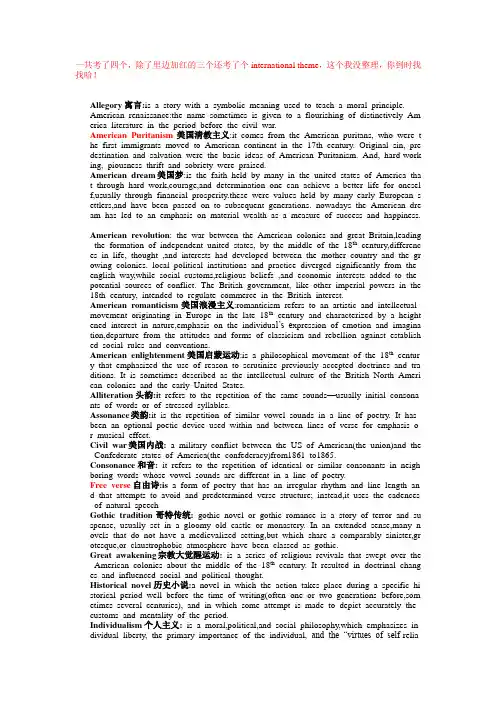
一共考了四个,除了里边加红的三个还考了个international theme,这个我没整理,你到时找找哈!Allegory寓言:is a story with a symbolic meaning used to teach a moral principle.American renaissance:the name sometimes is given to a flourishing of distinctively Am erica literature in the period before the civil war.American Puritanism美国清教主义:it comes from the American puritans, who were t he first immigrants moved to American continent in the 17th century. Original sin, pre destination and salvation were the basic ideas of American Puritanism. And, hard-work ing, piousness thrift and sobriety were praised.American dream美国梦:is the faith held by many in the united states of America tha t through hard work,courage,and determination one can achieve a better life for onesel f,usually through financial prosperity.these were values held by many early European s ettlers,and have been passed on to subsequent generations. nowadays the American dre am has led to an emphasis on material wealth as a measure of success and happiness.American revolution: the war between the American colonies and great Britain,leading the formation of independent united states, by the middle of the 18th century,differenc es in life, thought ,and interests had developed between the mother country and the gr owing colonies. local political institutions and practice diverged significantly from the english way,while social customs,religious beliefs ,and economic interests added to the potential sources of conflict. The British government, like other imperial powers in the 18th century, intended to regulate commerce in the British interest.American romanticism美国浪漫主义:romanticism refers to an artistic and intellectual movement originating in Europe in the late 18th century and characterized by a height ened interest in nature,emphasis on the individua l’s e xpression of emotion and imagina tion,departure from the attitudes and forms of classicism and rebellion against establish ed social rules and conventions.American enlightenment美国启蒙运动:is a philosophical movement of the 18th centur y that emphasized the use of reason to scrutinize previously accepted doctrines and tra ditions. It is sometimes described as the intellectual culture of the British North Ameri can colonies and the early United States.Alliteration头韵:i t refers to the repetition of the same sounds—usually initial consona nts of words or of stressed syllables.Assonance类韵:it is the repetition of similar vowel sounds in a line of poetry. It has been an optional poetic device used within and between lines of verse for emphasis o r musical effect.Civil war美国内战:a military conflict between the US of American(the union)and the Confederate states of America(the confederacy)from1861 to1865.Consonance和音:it refers to the repetition of identical or similar consonants in neigh boring words whose vowel sounds are different in a line of poetry.Free verse自由诗:is a form of poetry that has an irregular rhythm and line length and that attempts to avoid and predetermined verse structure; instead,it uses the cadencesof natural speechGothic tradition哥特传统: gothic novel or gothic romance is a story of terror and su spense, usually set in a gloomy old castle or monastery. In an extended sense,many n ovels that do not have a medievalized setting,but which share a comparably sinister,gr otesque,or claustrophobic atmosphere have been classed as gothic.Great awakening宗教大觉醒运动:is a series of religious revivals that swept over the American colonies about the middle of the 18th century. It resulted in doctrinal chang es and influenced social and political thought.Historical novel历史小说:a novel in which the action takes place during a specific hi storical period well before the time of writing(often one or two generations before,som etimes several centuries), and in which some attempt is made to depict accurately the customs and mentality of the period.Individualism个人主义: is a moral,political,and social philosophy,which emphasizes in dividual liberty, the primary importance of the individual, and the “virtues of self-reliance”Irony反讽:irony is a contrast or a difference between the way things seem and the w ay they really are.verbal irony occurs when words that appear to be saying one thing are really saying something quite different.situational irony occurs when what is expect ed to happen is not what actually comes to pass. Dramatic irony occurs when events that mean one thing to the characters mean something quite different to the reader. iro ny is often accompanied by a grim humor.Lyric抒情诗: in the modern sense, it is any fairly short poem expressing the personal mood,feeling,or meditation of a single speaker. Lyric poetry is the most extensive cat egory of verse. Lyrics may be composed in almost any meter and on almost every su bject,although the most usual emotions presented are those of love and grief. Among t he common lyric forms are the sonnet, ode, elegy, and the more personal kinds of hy mn.Local colorism地方特色主义: local colorism is a type of writing that was popular in the late19th century,particularly among authors in the South of the u.s. this style relie d heavily on using words,phrases,and slang that were native to the particular region in which the story took place.Naturalism自然主义:naturalism,a more deliberate kind of realism,usually involves a vi ew of human beings as passive victims of natural forces and social environment.Natur al fiction aspired to a sociological objectivity,offering detailed and fully researched inv estigations into unexplored corners of modern society.Original sin原罪:i n christian theology,the sin of Adam,by which all humankind fell fr om divine grace,stating that the essentially graceless nature of humanity requires redem ption to save it.Point of view视角:it is the relationship of the storyteller or narrator, to the story.a st ory has a first-person point of view if one of the characters,referred to as “i”,tells the story. A story has a limited third-person point of vies if the narrator reveals the thou gh ts of only one character but refers to that character as “he”or”she”.Realism现实主义: it is, in literature,an approach that attempts to describe life without idealization or romantic subjectivity.In part, realism was a reaction against the romant ic emphasis on the strange, idealistic, and long-ago and far-away.Sonnet十四行诗: it is a poem consisting of 14 lines,with rhymes arranged according t o one or other of certain definite schemes,of which the Petrarchan and the Elizabethan are principal ,namely:abba abba OR abab cdcd efef gg.Social Darwinism社会达尔文主义:social Darwinism was an application of Charles Dar win’s theory of evolution to the field of social relations. Social Darwinism argued that social progress resulted from conflicts in which the fittest or best adapted individuals, or entire societies, would prevail.Transcendentalism超验主义:is a literature, philosophical and artistic movement that fl ourished in new England from about 1836 to 1860. The beliefs that god is immanent in each person and in nature and that individual intuition is the highest source of kno wledge led to an optimistic emphasis on individualism, self-reliance, and rejection of t raditional.Unitarianism上帝一位论:is general,the form of Christianity that denies the doctrine of the Trinity,believing that God exists only in one person.The modern Unitarianism orig inated in the period of the Protestant Reformation.。
名词解释1. Abby Theatre 阿贝剧院阿贝剧院是爱尔兰的国家剧院,由爱尔兰著名诗人William Butler Yeats和Lady Augusta Gregory创建。
该剧院上演爱尔兰剧作家的作品。
Lady Gregory是阿贝剧院的导演,同时也是个剧作家(dramatist)。
2.Aestheticism 唯美主义基本原则:Art for art’s sake.基本人物:英国运用该美学理论的第一人士Walter Pater。
Oscar Wilder(Picture of Dorian Gray)是该理论的杰出代表。
基本思想:唯美主义崇尚艺术高于生活,生活应该模仿艺术,而不是艺术模仿生活。
这是对Victorian工业发展时期宣扬的物质崇拜(materialism)和商业主义(commercialism)的一种反抗,也是艺术为道德或金钱而服务(art for money’s sake)的维多利亚传统的挑战。
3. Age of Enlightenment 启蒙时代1. 英国的18世纪又被称为启蒙时代,总的来说是资本主义反对封建主义的时代。
2. 启蒙运动是一场进步的思想运动,盛行于法国后传播到西欧。
3. 启蒙运动是15和16世界文艺复兴运动的延续和深入,它的目的是用现代哲学和艺术观点启蒙整个世界。
4. 崇尚理性,平等,和科学,倡导大众教育。
文学在当时变成了非常受欢迎的公众教育的手段,带有强烈的说教和道德教育性质。
5. 代表人物:Alexander Pope,Jonathan Swift。
4. Age of Realism现实主义时期1. 现实主义是对浪漫主义时期一种反抗,并铺就了通往现代主义文学的道路。
2. 在这一时期,新一代的作家对于老一辈的浪漫主义和感伤主义的思想非常不满,提出一个新的灵感,其特点就是在生活现实方面有着极大的兴趣。
它的目标是描写生活每一方面的现实,抛弃主观偏见,理想主义或者任何浪漫的色彩。
1.The Enlightenment(启蒙运动): The Enlightenment was anintellectual movement originating in France, which attracted widespread support among the ruling and intellectual classes of Europe and North America in the second half of the 18th century. It characterizes the efforts by certain European writers to use critical reason to free minds from prejudice, unexamined authority and oppression by Church or State. Therefore, the Enlightenment is sometimes called the Age of Reason.2.2. American Dream(美国梦): It is the faith held by many people in the United States of America that through hard work, courage, and determination one can achieve a better life for oneself, usually through financial prosperity. These were values held by many early European settlers, and have been passed on to subsequent generations. Nowadays the American Dream has led to an emphasis on material wealth as measure of success or happiness.3. Transcendentalism (超验主义、先验主义) : It was a group of new ideas in literature, religion, culture and philosophy that emerged in New England in the middle 19th century. It began asa protest against the general state of culture and society. Among transcendentalist’s core beliefs was an ideal spiritual state that “transcends” the physical and empirical(以观察或实验为依据的) and is only realized through the individual’s intuition, rather than through the doctrines of established religions. Prominent transcendentalists included Ralph Waldo Emerson(爱默生), Henry David Thoreau(梭罗), Walt Whitman (惠特曼), etc. It is a kind of philosophy that stresses belief in transcendental things and the importance of spiritual rather than material existence. 4. American Puritanism: It is the practices and beliefs of the Puritans. The Puritans were originally members of a division of the Puritan Church. The first settlers who became the founding fathers of the American nation were quite a few of them. They were a group of serious, religious people, advocating highly religious and moral principles. As the word itself hints, Puritans wanted to purity their religious beliefs and practices. They accepted the doctrine of predestination 宿命论, original sin and total depravity性恶说, and limited atonement 有限的救赎 through a special infusion 浸渍 of grace from God. As a culture heritage, Puritanism did have a profoundinfluence onthe early American mind.5.Symbolism:It is the writing technique of using symbols. It’sa literary movement that arose in France in the last half of the 19th century and that greatly influenced many English writer, particularly poets, of the 20th century. It enables poets to compress a very complex idea or set of ideas into one image or even one word. It’s one of the most powerful devices thatpoets employ in creation.7.Gothic novel is a type of romance very popular late in the 18th century and at the beginning of the 19th century. Gothic novel emphasizes things which are grotesque怪异的, violent,mysterious,supernatural,desolate 荒凉and horrifying. Gothic,originally in the sense of “medic医学,not classical”,with its descriptions of the dark,irrational side of human nature,Gothic novel has exerted a great influence over the writers of the Romantic period.8. Imagism: It came into being in Britain and U.S around 1910 as a reaction to the traditional English poetry to express thesense of fragmentation破碎and dislocation混乱. The imagists, with Ezra Pound leading the way, hold that the most effective means to express these momentary impressions is through the use of one dominant image. Imagism is characterized by the following three poetic principles: direct treatment of subject matter; economy of expression; as regards rhythm, to compose in the sequence of the musical phrase, not in the sequence of metronome节拍器. Pound’s “In a Station of the Metro” is a well-known imagist poem.9. Stream of Consciousness(意识流): It is a style used in the presentation of the character’s inner working of mind. The assumption is that an individual’s psychological processes are a continuous flow like a shifting, uninterrupted stream, highly changeable and confusing, often appearing illogical and contrary to reason. In tracing the stream of consciousness of an individual the writer may present interior monologue(内心独白) by his character, hint with symbols, reverse(颠倒) the order of time, and alternate(轮流的/交替的) recollections (回忆) with the present or sometime illusions(幻想) with given facts.10. Point of view( 视角):It is a term referring to the vantage point (能观察某事物的有利位置) or position from which a story is told. To identify(识别) the narrator of a story is to identify the story’s point of view. Basically there are two narrative ways: first-person point of view and the third-person point of view.11. Expressionism 表现主义: it arouse in German theater after World War I. Delighting in bizarre (奇异的) stage design and exaggerated makeup and costuming(服装), expressionists sought to reflect intense states of emotion. Its mode is “the externalization(外表性) of the inner.”12. The Harlem Renaissance: it was the first important movement in black American literature. Immediately after the First World War, as a result of a massive black migration to Northern cities, a group of young, talented black artists congregated in Harlem, a predominantly black section of New York City, and made it the cultural, and intellectual capital of black America. They carried forward the cultural traditions of their people and demonstrated their achievements to the white society that habitually ignored them.13.Black humor: It is a combination of humor with resentment(怨恨), gloom, anger, and despair. Seeing all that is unreasonable, hypocritical, ugly, and even frenzied(狂乱的),writers of black humor nurse a grievance(不平) against their society which, according to them, is full of institutionalized(制度化的) absurdity. Yet they are cynical. They laugh a morbid(病态的) laugh when facing the hideous(丑恶的). In hopeless indignation (愤慨) they take up freezing irony and burning satire as their weapons. Their novels are often in the form of anti-novel(反传统小说), devoid of(缺乏) completeness of plot and characterized by fragmentation(零碎的) and dislocation(混乱).。
名词解释(英国)Epic(叙事诗): Epic is a narrative poem on the grand scale and in majestic style concerning the exploits and adventures of a superhuman hero (or heroes) engaged in a quest or some serious endeavor. Among noted epics are Homer’s Iliad and Odyssey, old English Beowulf and Milton’s Paradise Lost.Romance(传奇):A Romance is a long composition, in verse or in prose, describing the life and adventures of a noble hero. It generally concerns knights and involves a large amount of fighting as well as a number of miscellaneous adventures and a series of love stories.Ballad(民谣):Ballad is an anonymous narrative song, usually in 4-line stanzas, with the second and the fourth lines rhymed.Renaissance(文艺复兴):The word “Renaissance” means “rebirth”(of learning). The Renaissance period was marked by a reawakening of interest in learning, in the individual and in the world of nature. The revival of learning led scholars back to the culture of Greece and Rome. The rebirth of interest in the individual gave rise to a new appreciation of beauty, to a desire for self-expression in varied activities and to the creation of great works of art. The renewal of curiosity about the natural world ultimately drew men to discover new lands and new scientific truth. Humanism(人道主义):Humanism was a literary and philosophic system of thought which attempted to place the affairs of mankind at the centre of its concerns. According to humanists, man should mould the world according to his own desires, and attains happiness by removing all external checks by the exercise of the human intellect.Sonnet(十四行诗):A sonnet is a fourteen-line poem in iambic pentameter with a carefully patterned rhyme scheme.Puritanism(清教主义):Puritanism was the religious doctrine of revolutionary bourgeoisie during the English Revolution. It preached thrift, sobriety, hard work and unceasing labor, with noextravagant enjoyment of thefruits of labor. Worldlypleasures were condemned asharmful. Puritans opposedchurches,squandering property.Enlightenment(启蒙运动):The movement, on the whole,an expression of the struggle ofthe bourgeoisie againstfeudalism, class inequality,stagnation and prejudices. Theenlighteners believed in thepower of reason and thewatchword was CommonSense.Neo-classicism(新古典主义):Modeling itself on theliterature of ancient Greece andRome, neoclassicism exalts thevirtues of proportion, unity,harmony, grace, taste, manners,and restraint. It values realismand reason over imaginationand emotion. Wit and satireflourished in this period, as didthe ode and verse written inheroic couplets.Romanticism(浪漫主义):Romanticism is a movementprevailing the Western world inthe 19th century in literature,art, music and philosophy,beginning as a reaction andprotest against the bondage ofrules and customs ofneo-classicism to unfetterhuman spirit. It returned tonature and plain humanity formaterial. It is a movement ofexpression of individualoriginality. Imagination ishighlighted and a dream ofgolden age is required againststern reality.Critical Realism(批判现实主义):Critical realistsdescribed with much vividnessand artistic skill the chief traitsof the English society andcriticized the capitalist systemfrom a democratic viewpoint.In their best works, the greedand hypocrisy of the upperclasses are contrasted with thehonesty and good-heartednessof the obscure “simple people”of the lower classes. Humorand satire abound. Withoutfinding a way of solution, theydo not point toward revolutionbut rather evolution orreformism with happy endings.Aestheticism(唯美主义):Thebasic theory of the Aestheticmovement---“art for art’s sake”.Aestheticism places art abovelife, and holds that life shouldimitate art, not art imitate life.According to the aesthetes, allartistic creation is absolutelysubjective as opposed toobjective. Only when art is forart’s sake, can it be immortal.Stream of Consciousness(意识流小说):First, it reveals theaction or plot through themental processes of thecharacters. Second, characterdevelopment is achievedthrough revelation of extremelypersonal and often typicalthought processes. Third, theaction of the plot seldomcorresponds to realchronological time, but movesback and forth through presenttime to memories of pastevents and dreams of the future.Fourth, it replaces narration,description, and commentarywith interior monologue andfree association.Women’s Movement(女性运动):feminism is a belief in thesocial, political and economicequality of the sexes, and amovement organized aroundthe conviction that biologicalsex should not be thepre-determinant factor shapinga person's social identity orsocio-political or economicrights.Oedipus Complex(恋母情结):In Greek myth, Oedipus isthe king who is said to kill hisfather and marry his mother.According to Freud, childrenmay have sexual drivessubconsciously toward theopposite parent. Here, Oedipuscomplex refers to that boy’sobsession to his mother. InEnglish literature, Lawrence isthe first to introduce malecharacters’ impotence tofemales because of mother’sexcessive love.(美国)American Puritanism(美国清教)The settlements grew out ofreligious controversy, out of anurge for religious freedom anddetermination, out of fleeingfrom religious and politicaloppression and persecution, outof human thirst for greatereconomic opportunity, for land,and for adventure. AmericanPuritans stressed predestination,original sin, total depravity andlimited atonement from God’sgrace. They built a way ofstressed hard work, diligenceand thrift, piety and sobriety,rigid sense of morality,self-reliance.Transcendentalism (超验主义)Transcendentalism is aphilosophical and literarymovement centered in Concordand Boston, which wasprominent in the intellectualand cultural life of NewEngland from 1836 until justbefore the Civil War. It stressesmode of knowledge groundedin feeling and intuition;self-trust, self-reliance andself-sufficiency; a turn awayfrom modern society; a faith ina divine “Principle”, or “Spirit”,or “Soul”.Gothic novel(哥特式小说)In gothic novel, there is usuallya gloomy castle furnished withdungeon. The typical storyfocused on the sufferingsimposed on an innocentheroine by a cruel and lustfulvillain, and made bountiful useof ghosts, mysteriousdisappearances, and othersensational and supernaturaloccurrence. The principal aimof such novels was to evokechilling terror and a variety ofhorror.。
美国文学史选择题●美国文学主要分为四个时期:●I. The Literature Around the Revolution of Independence(独立革命前后的文学)。
●一、殖民地时期(The Literature of Colonial American) (Colonial Period 1607--1775[独立战争1775-1783])●其他:●major topic: American Puritanism●起源(关键概括):●是English Protestant的一个分支、Martin Luther(1517)、JohnCalvin、因他们认为伊丽莎白教会改革不彻底、unscriptural不根据基督教《圣经》来--而called for further purification、"would bepurifier"●清教主义信仰(关键内容概括):●purify the English Church让宗教崇拜重返早期"pure and unspotted"condition、反教会的繁杂仪式rituals、人们要根据《圣经》行事●教条学说:●把宗教当成最重要的事●为了光辉上帝活着●相信:●predestination预言天数上帝拯救、拯救少数●limited atonement赎罪耶稣死亡是上帝选择、不是为了大家●oringinal sin & total depravity堕落每个人生来有原罪、应该努力工作●清教主义表现/影响:●道德卓越moral excellence与良知conscience●重教育●努力、节俭thrifty、独立●有上帝选民chosen people意识●实践理想主义、教条机会主义●欢愉是罪●文学贡献:促进了象征主义的发展--Puritans 认为任何一个简单的东西都有深意connoted deep meaning.●印第安文学Native American Literature●major forms: legends, folktales, battle songs and poems●早期来美洲的目的:金子、土地、宗教迫害persecution、政治观念错误、穷人、罪犯、经商●美洲殖民地:●第一个:1607 英国人建立Jamestown--现在的Virginia●第二个:1620 William Bradford领导的清教徒,乘坐May Flower号船,到今天的Massachusetts●人物集:●1、约翰•史密斯(John Smith):早期英国殖民者、探险家,在弗吉尼亚建立了第一个永久英国殖民地。